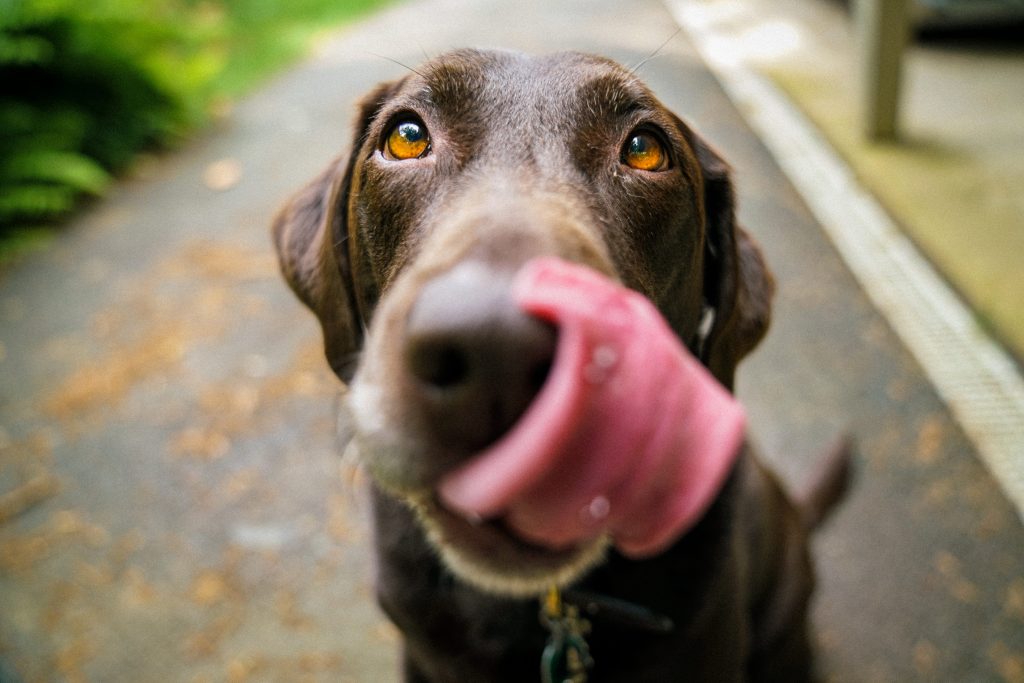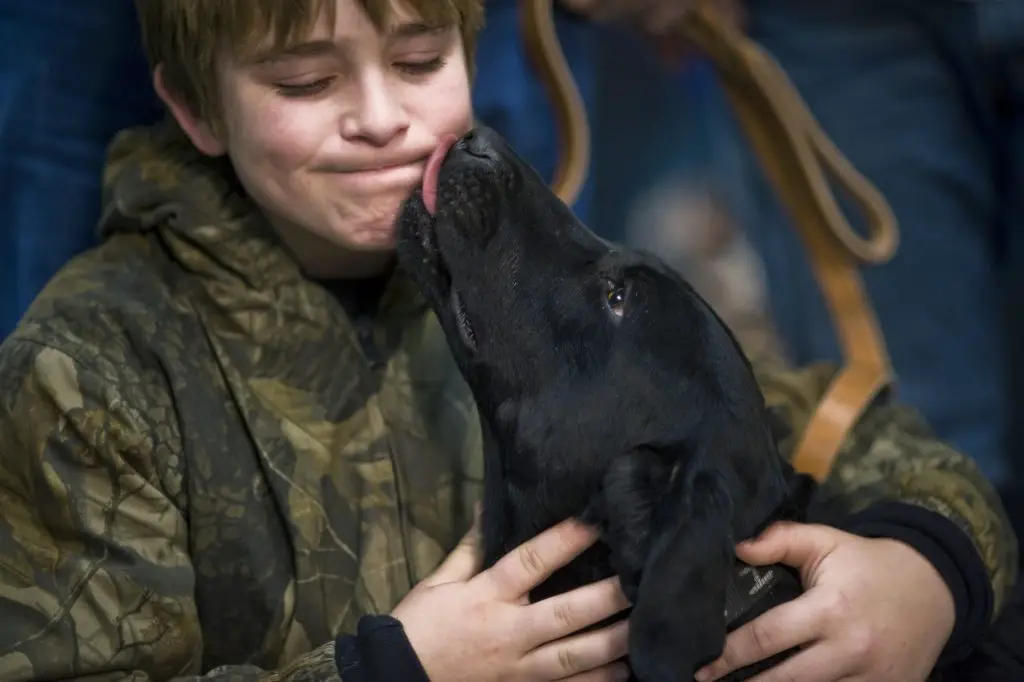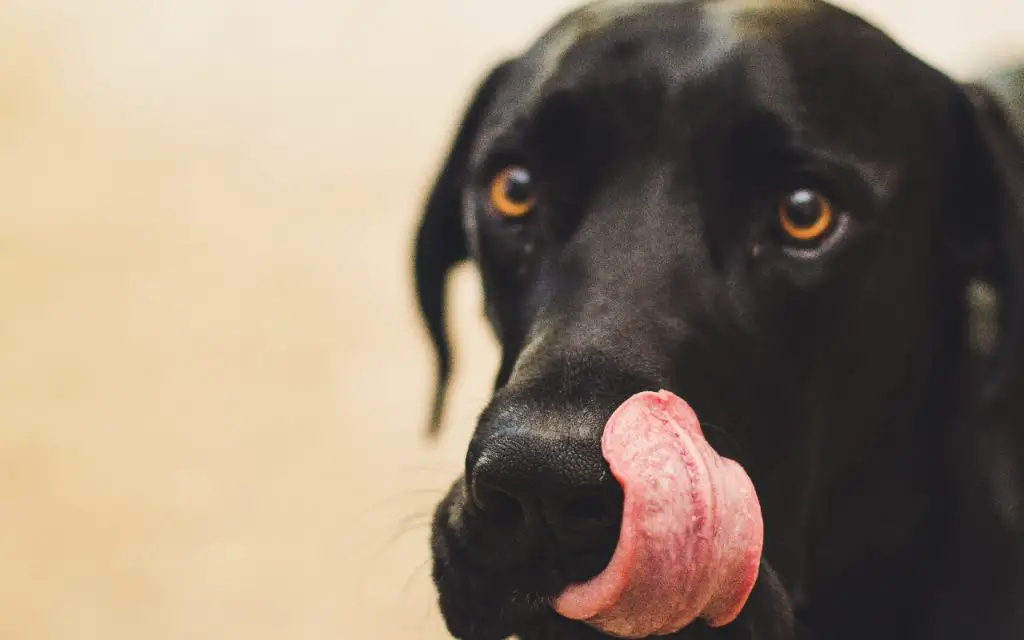Do you have a Labrador Retriever? If so, you may have noticed that they love to lick. In fact, Labradors lick a lot! But why do they do it? There are actually several reasons why dogs lick, but the science of dog licking is still somewhat of a mystery.
In this blog post, we will explore the different reasons why dogs lick and what it means for their behavior. We will also discuss some of the health benefits associated with dog licking. So if you’re curious about why your Labrador licks so much, keep reading!
Key Takeaway
- Labradors, like many dogs, lick so much as a way to show affection, communicate, explore their environment, clean themselves, and even cope with stress, but excessive licking could indicate issues such as hunger, dehydration, anxiety, or health problems.
- To get your Labrador to stop licking, you can try redirecting their attention with toys or commands, ensuring they have enough mental and physical stimulation, maintaining a consistent routine, using taste deterrents, or consulting with a vet or animal behaviorist if the licking seems excessive or obsessive.
Why Do Labradors Lick So Much?

One of the most common reasons why Labradors lick is because they are trying to communicate with you. When a Labrador licks your face, it is usually its way of showing affection. Labradors also lick their own bodies as a way to groom themselves. This helps them to keep their fur clean and healthy. Labradors will also lick other dogs as a sign of friendship or dominance.
Labradors have more taste buds than other breeds of dogs. This means that they can enjoy the taste of different foods more than other dogs. Another theory is that Labradors are just naturally social creatures who love to interact with their humans. Whatever the reason, one thing is for sure: Labradors love to lick!
Labradors have a very interesting tongue. It is actually quite long, and it has special barbs on the end that help to remove debris from their coat. This licking behavior helps to keep them clean and healthy! Additionally, some believe that licking releases endorphins in their brain that make them feel happy and content.
Labrador Retrievers were bred as hunting dogs, and part of their job was to help their human companions flush out game birds by licking them. This behavior may have carried over into domestic life, where Labs continue to show their affection by licking the faces of the people they love.
There are also some health benefits associated with dog licking. When a dog licks your wound, it can actually help to clean and disinfect it. Dog saliva has antibacterial properties that can help to fight infection. Dog licking can also help to relieve pain and itchiness associated with wounds and skin conditions says AKC.
How Do I Get My Labrador To Stop Licking?

Although there isn’t a simple answer on why your dog is licking, there are a few things you can do to stop your labrador from licking.
1. Find the cause of licking
There are many reasons why Labradors lick themselves. It could be because they’re trying to remove something from their fur, or they may simply enjoy the taste of their own skin. Whatever the reason, it’s important to make sure that your dog is healthy and not licking themselves excessively.
If your Labrador is constantly licking his paws or a certain spot, it could be a sign of an underlying health condition like allergies or anxiety.
However, if there are no clear signs of health issues, One way to stop a Labrador from licking its paw is to provide it with an alternative source of attention. For example, if you pet the Labrador while it is licking its paw, it may eventually stop licking the paw and focus on being petted instead.
There are a few other things that could be causing your Labrador to lick excessively. It could be a sign of anxiety or boredom, and it might even be a way for your Labrador to get attention.
If you think your Labrador is licking out of boredom, try providing them with more toys and chews. If it’s due to anxiety, consider working on some basic obedience training or providing more opportunities for exercise.
2. Redirect the negative behavior
One way to redirect a Labrador’s licking behavior is to provide them with an alternate outlet for their licking, such as a Kong toy filled with peanut butter or another treat. You can also try teaching your Labrador a “leave it” or “no” cue to help them understand that licking is not always allowed.
A great way to get your Labrador to stop licking is by redirecting the negative behavior. One way is to provide a tasty treat or chew toy for them to focus their attention on instead.
3. Create an unpleasant sensation when they lick
Another way to stop your Labrador from licking is by creating an unpleasant sensation when they lick. This could be done by placing the double-sided tape on areas where you do not want them to lick, or by using a taste deterrent spray on those areas.
It’s important to be consistent with this method and only use it when your Labrador is actually licking, otherwise, they may become confused.
4. Go out for a walk
Labradors are known for their friendly nature and love of licking. Unfortunately, this can sometimes lead to excessive licking which can become a problem behavior. If you’re wondering how to stop your labrador from licking, exercise may be the answer.
Exercise is a great way to burn off excess energy and help your dog stay calm and focused. A tired Labrador is less likely to engage in unwanted behaviors like excessive licking. So, if you’re looking for a way to stop your labrador from licking, try increasing their exercise. A daily walk or run will do wonders for their behavior.
5. The reason might be you

Labradors have a much keener sense of smell than we do, and they can often pick up on subtle changes in our scent that we may not be aware of.
If you notice your dog licking you more often than usual, it could be because they are trying to comfort you or make contact with you. It’s also possible that something has changed in your scent that is causing them to be curious or concerned.
One common reason Labradors lick their owners is to show affection. Labradors are highly social creatures, and licking is a way for them to interact with and show affection for the people they care about. If your dog licks you more when you’re petting them or giving them attention, it’s likely that they are trying to show you how much they love you.
Another possibility is that your Labrador is experiencing some sort of anxiety or stress. Labradors can often sense when we are feeling overwhelmed or stressed, and they may try to lick us as a way of comforting us. If your dog only licks you when you seem upset or stressed, it’s possible that they are trying to help you feel better.
6. Reward the good behavior
You shouldn’t necessarily reward your dog each time they don’t lick. However, you may want to consider using positive reinforcement, in general, to train your dog not to lick. Try praising your dog or giving them a treat when they refrain from licking.
Over time, they should learn that it’s better not to lick than to get a negative reaction from you.
Additionally, make sure that you are consistent with your commands and rewards; if you only sometimes give your dog a treat for not licking, they will be more likely to continue the behavior since they think there’s a chance they’ll still get something out of it.
FAQs
Q: Is it normal for Labradors to lick themselves excessively?
A: While some licking is normal for Labradors, excessive licking can be a sign of an underlying issue. It could indicate skin irritation, allergies, boredom, or anxiety. If you notice that your Labrador is excessively licking themselves, it is important to consult with a veterinarian to rule out any medical conditions.
Q: How can I prevent my Labrador from licking everything?
A: There are a few strategies you can try to discourage your Labrador from excessive licking. First, make sure to provide them with plenty of mental and physical stimulation to keep them occupied. Engage them in regular exercise and provide them with interactive toys. Additionally, you can redirect their licking behavior by offering them chew toys or treats when they start licking something they shouldn’t.
Q: Can excessive licking cause health problems for Labradors?
A: Excessive licking can potentially lead to health problems for Labradors. It can cause skin irritation, hot spots, and potentially lead to secondary infections. If your Labrador’s licking becomes excessive or they start to develop any skin issues, it is important to seek veterinary advice.
Q: Should I be concerned if my Labrador licks me constantly?
A: Labradors are known for being affectionate and showing their love through licking. However, if your Labrador’s constant licking becomes bothersome or uncomfortable, it is important to establish boundaries and train them to understand when licking is appropriate. Consistent and positive reinforcement training can help teach them limits.
Q: How can I redirect my Labrador’s licking habit?
A: To redirect your Labrador’s licking habit, it is important to provide them with alternative behaviors that are more desirable. Teach them commands such as “sit” or “down” and reward them with treats and praise when they follow those commands instead of licking. Offering them interactive toys or puzzle toys can also help redirect their focus and energy away from excessive licking.
Q: Are there any health benefits to a Labrador’s licking behavior?
A: Yes, there can be some health benefits to a Labrador’s licking behavior. Licking can help promote wound healing as their saliva contains enzymes that have antibacterial and antifungal properties. However, it is important to note that excessive licking can negate these benefits and potentially lead to other health issues.
Q: Can I train my Labrador to stop licking altogether?
A: While it may be difficult to completely stop a Labrador from licking, you can train them to understand when licking is appropriate and when it is not. Consistency and positive reinforcement training can help you establish boundaries and redirect their licking behavior to more desirable actions.
Q: Should I be worried if my Labrador suddenly starts licking more than usual?
A: A sudden increase in licking behavior in Labradors can be a sign of underlying stress, anxiety, or a medical issue. If you notice a significant change in your Labrador’s licking habits, it is important to observe their overall behavior and consult with a veterinarian if necessary.
Q: Can I use bitter spray or deterrents to stop my Labrador from licking?
A: Bitter sprays or deterrents can be used to discourage excessive licking in Labradors. These products usually have a bitter taste that dogs find unpleasant, and applying them to objects or surfaces your Labrador tends to lick can help deter the behavior. However, it is important to choose a product that is safe for dogs and follow the instructions carefully to ensure its effectiveness.
Conclusion and final thoughts
Concluding this blog post, it is clear that Labradors are very affectionate and gentle animals who love to show their affection through licking.
They may also lick as a sign of submission or to get attention from their owners. With proper training, however, Labradors can be taught not to excessively lick and instead express their emotions in other ways.
Ultimately, owning a Labrador is a rewarding experience that requires dedication and patience.




